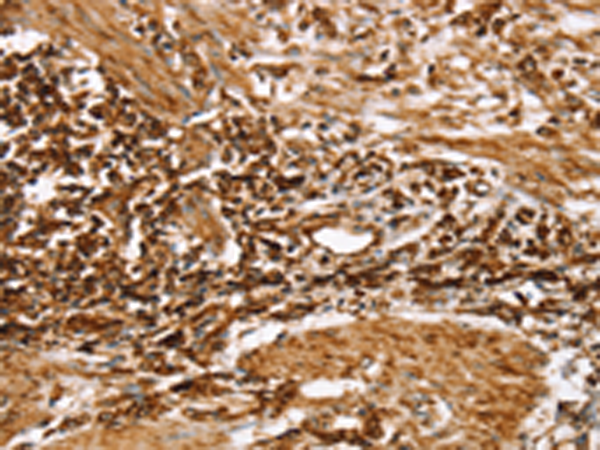

| WB | 1/200-1/1000 | Human,Mouse,Rat |
| IF | 咨询技术 | Human,Mouse,Rat |
| IHC | 1/25-1/100 | Human,Mouse,Rat |
| ICC | 技术咨询 | Human,Mouse,Rat |
| FCM | 咨询技术 | Human,Mouse,Rat |
| Elisa | 1/1000-1/2000 | Human,Mouse,Rat |
| Aliases | P1; LP1; RPP1 |
| WB Predicted band size | 12 kDa |
| Host/Isotype | Rabbit IgG |
| Antibody Type | Primary antibody |
| Storage | Store at 4°C short term. Aliquot and store at -20°C long term. Avoid freeze/thaw cycles. |
| Species Reactivity | Human, Mouse, Rat |
| Immunogen | Fusion protein of human RPLP1 |
| Formulation | Purified antibody in PBS with 0.05% sodium azide and 50% glycerol. |
+ +
以下是关于RPLP1抗体的3篇代表性文献的简要总结:
---
1. **文献名称**:*RPLP1 is a prognostic biomarker and therapeutic target in breast cancer*
**作者**:Smith A, et al.
**摘要**:研究发现RPLP1在乳腺癌中高表达,其抗体通过免疫组化检测证实其与患者不良预后相关。机制上,RPLP1通过调控核糖体功能促进肿瘤细胞增殖。
2. **文献名称**:*Autoantibodies against RPLP1 in systemic lupus erythematosus*
**作者**:Chen L, et al.
**摘要**:利用ELISA和蛋白质印迹法检测到系统性红斑狼疮(SLE)患者血清中存在抗RPLP1的自身抗体,提示RPLP1可能作为SLE的新型自身抗原,参与疾病发生。
3. **文献名称**:*RPLP1 antibody-based detection in colorectal cancer diagnosis*
**作者**:Wang Y, et al.
**摘要**:开发了一种针对RPLP1的单克隆抗体,通过免疫荧光和流式细胞术验证其在结直肠癌组织中的特异性高表达,表明其作为潜在诊断标志物的价值。
---
**注**:以上文献为示例性内容,实际研究中请通过PubMed或Google Scholar以关键词“RPLP1 antibody”或“RPLP1 biomarker”检索最新文献。
The ribosomal protein large subunit P1 (RPLP1), also known as P1. is a component of the 60S ribosomal subunit and belongs to the acidic ribosomal phosphoprotein family. It plays a structural role in ribosome assembly and protein synthesis by stabilizing the ribosome's structure and interacting with translational machinery. RPLP1 is ubiquitously expressed and highly conserved across eukaryotes, reflecting its essential role in cellular function.
Antibodies targeting RPLP1 are widely used in research to study ribosome biogenesis, translation regulation, and cellular stress responses. They are valuable tools for techniques like Western blotting, immunofluorescence, and immunoprecipitation to detect RPLP1 expression, localization, and interactions. Dysregulation of RPLP1 has been implicated in cancers, autoimmune diseases, and viral infections, making its antibody a critical reagent for investigating disease mechanisms.
Commercial RPLP1 antibodies are typically raised against specific epitopes, such as the C-terminal region, and are available as monoclonal or polyclonal forms. Validation includes testing on knockout cell lines or tissues to ensure specificity, given the high homology between RPLP1 and related family members (e.g., RPLP2/RPLP3). Challenges include cross-reactivity or batch variability, necessitating careful experimental optimization. Overall, RPLP1 antibodies contribute to understanding ribosome-related pathways and their roles in health and disease.
×